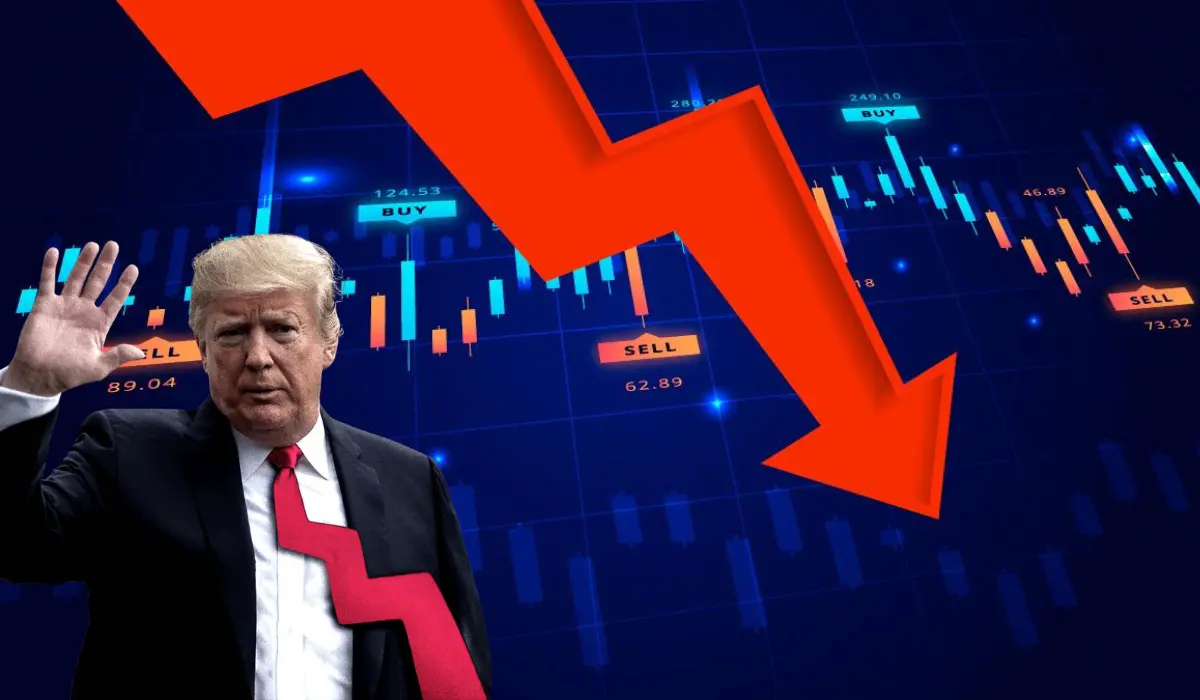
The Indian stock market witnessed a sharp downturn as benchmark indices plummeted due to heightened investor concerns about potential trade policy changes under former U.S. President Donald Trump’s second term. By 2:45 PM, the Sensex dropped 1,300 points to 75,773, and the Nifty50 slipped below 23,000. Several heavyweight stocks, including Zomato and Reliance, faced steep declines, pulling broader market indices into negative territory.
Here’s a detailed look at the factors behind this market crash.
Key Reasons for the Market Crash
1. Trump’s Tariff Policy Uncertainty
The announcement of new tariff plans by Donald Trump upon his return to office has unsettled global markets. Investors fear that proposed duties on neighboring countries could lead to strained trade relations and disrupt global economic stability.
Vinod Nair, Head of Research at Geojit Financial Services, commented, “Trump’s declaration of trade tariffs created heightened uncertainty in global markets, leading to significant sell-offs in domestic equities.”
Prashanth Tapse, Senior VP (Research) at Mehta Equities Ltd, noted that cautious market sentiment in recent sessions turned into frenzied selling following Trump’s announcements.
2. Decline in Heavyweight Stocks
Major stocks across sectors tumbled sharply, exacerbating the market downturn. Zomato, for instance, recorded an 11% decline, contributing significantly to the Sensex’s fall. Reliance, ICICI Bank, HDFC Bank, and SBI also experienced steep losses, collectively adding to the downward momentum.
The real estate and banking sectors were particularly hard hit. Rising asset quality concerns and poor pre-quarter updates added to the pressure.
3. Disappointing Q3 Earnings
The third-quarter earnings season failed to meet market expectations, adding to the gloom. Bloomberg estimates project a modest 3% year-over-year growth in earnings per share (EPS) for Nifty50 companies.
Notably, sectors like capital goods, healthcare, and telecom are expected to post double-digit profit growth, but overall results have been underwhelming. For instance, consumer durables and real estate stocks fell sharply due to weak performance reports.
4. Surging Market Volatility
Volatility reached new highs as investors struggled to digest the implications of Trump’s delayed tariff plans. The lack of clarity about which sectors will be most affected has left markets in limbo, prompting a “wait and watch” approach from many investors.
5. Foreign Institutional Investors’ (FII) Selling
The Indian equity market has been grappling with sustained outflows from foreign institutional investors. As of January 20, FIIs have sold equities worth over ₹48,000 crore. This relentless selling pressure has intensified the market’s downward spiral.
Prashanth Tapse remarked, “The continuous FII outflow, coupled with fears of rising U.S. bond yields, could trigger further market declines.”
Sectoral Impact and Key Takeaways
1. Consumer Durables and Real Estate Stocks
- The Nifty Consumer Durables Index fell 3.2%, with stocks like Dixon Technologies dropping by over 13% after underwhelming Q3 results.
- The Nifty Realty Index declined nearly 3%, led by losses in Oberoi Realty and Lodha.
2. IT and Banking Sectors
- Heavyweights like HDFC Bank, ICICI Bank, and SBI faced sharp declines due to concerns over rising asset quality stress.
- IT stocks were impacted by fears of trade restrictions and weaker global demand.
Stock Market at a Glance
| Aspect | Details |
| Sensex Closing | 75,773 (Down 1,300 points) |
| Nifty50 Closing | Below 23,000 |
| Major Contributors | Zomato, Reliance, ICICI Bank, HDFC Bank |
| Key Sectoral Losses | Consumer Durables, Realty, Banking |
| Volatility Index (VIX) | Spiked significantly |
| Foreign Institutional Selling | ₹48,000 crore in January 2025 |
Outlook for Investors
The ongoing market turmoil underscores the importance of staying cautious in a volatile environment. With Trump’s tariff plans still unclear, global economic uncertainties are likely to persist. Experts suggest focusing on sectors with strong fundamentals and avoiding knee-jerk reactions to market fluctuations.
Conclusion
The sharp decline in Indian markets highlights the interconnectedness of global politics and economic stability. As investors navigate these uncertain times, staying informed and adopting a long-term investment strategy will be crucial.







